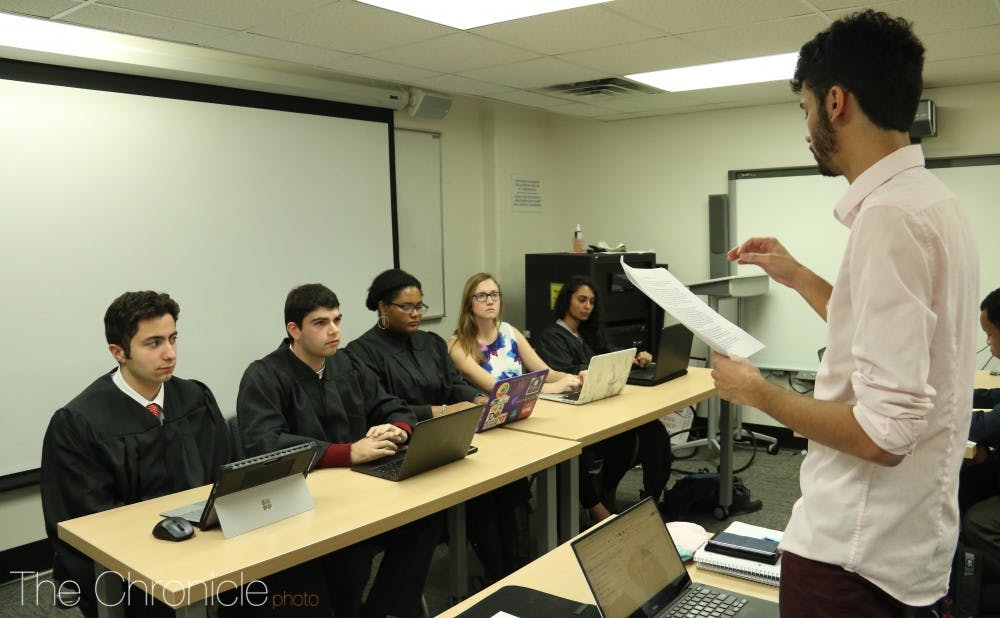The Duke Student Government Judiciary has been on the minds of many Duke students recently as it recently declined to grant Hyde House—the proposed selective social group—a new hearing in the DSG Senate. Though this case is over, it was not the Judiciary’s first significant case—or the most interesting.
The Judiciary is charged with ensuring that “the Duke Student Government's actions adhere to the Constitution, Bill of Rights, and Bylaws that govern it,” according to the DSG website. It has “constitutional and statutory oversight over the Senate, the Executive Board, [Student Organization Finance Committee]” and other on-campus student groups. This mission requires the Judiciary to mediate disputes between and among these organizations, with students bringing petitions to its seven justices.
Here are some of the cases DSG Judiciary has heard over the years that have had the most impact on Duke students—or simply the strangest.
Election hijinks
One of the Judiciary’s most publicized cases resolved the controversy over the 2017 election for DSG president. Attorney General Shreya Bhatia, then a sophomore, and the Board of Elections docked 200 votes from then-junior Kristina Smith for violating the election rule that banned soliciting votes “while possessing any laptop, tablet, or similar electronic device that can access the ballot.”
The specific violation involved campaign members using an iPad to play music outside Marketplace. Smith appealed the decision to the Judiciary, which decided that the rule was unconstitutional because it was “overly broad” and could restrict free speech. The Judiciary remanded the matter to Bhatia, who determined that Smith had broken no other rules. Smith was officially elected DSG president for the 2018-2019 school year.
“The scale of this case was absolutely major,” said senior Analese Bridges, chief justice of the Judiciary, who presided as associate justice during the case. “Anything where we’re reaching a constitutional question—in this case free expression—in something like an election case is something that will definitely impact the student body whether they realize it or not.”
This is not the only case the Judiciary has heard concerning on-campus elections. In 1998, the Judiciary determined that a voter-incentive program by the Interfraternity Council had violated DSG bylaws but did not call for a new election.
The initiative promised to waive IFC dues for the fraternity with the highest percentage of members who voted, which the Judiciary found to unfairly favor candidates that the IFC endorsed. The Judiciary’s response to the election tampering makes this case unique. Despite punishing the IFC, no new election was held.
“We do not see that IFC’s behavior affected the outcome of the election,” said then-junior Josh Shaffer, a justice at the time.
The decision prompted outrage for some students on campus. A column in The Chronicle by Minh-Thu Pham, Trinity '98, voiced displeasure with the Judiciary's decision and asserted that “if the Duke Student Government initially had any credibility, it [lost] it all with the judiciary’s ruling.”
K-Ville Craziness
This spring’s showdown over Krzyzewskiville policy began with a missed tent check and ended with the Judiciary ruling that the policy itself was unconstitutional.
At 2:30 a.m. on Feb. 14, Tent 74 missed a tent check, despite a line monitor calling for them with a blowhorn. The tenters appealed the decision, claiming that two tenters had been present but had missed the check because one was deeply asleep and the other had hearing difficulties.
The Judiciary found that K-Ville's policy violated the DSG Constitution Bill of Rights because it did not “include specific language regarding reasonable accommodations for students in K-Ville.”
“That one was crazy, if you will,” Bridges said. “Because it just seemed fairly standard in that you had a tent that had missed a tent check, a very normal occurrence in K-Ville. When you really start peeling back the layers, we saw that at the time K-Ville policy did not have a disability policy, so they had no way of officially accommodating disabilities.”
Despite the Judiciary ruling in their favor, Tent 74 was not allowed to return to K-Ville after the decision. The line monitors determined that the evidence provided did not prove the tenters had been there during the check.
Judiciary vs. the Senate
Another serious case came in the form of the 2016 dispute over the PASH Reform Act, which reduced funding approved by the PASH Responsibility Act. The original act allotted $17,252 to the center, and the subsequent act cut the funding to $12,762. Both acts were passed in April 2016.
Bridges said that the case was unique because of its complexity. The petition cited the Senate’s House Rules and By-Laws, as well as the DSG Constitution.
“I remember us deliberating for quite a long time over the intricacies of the case, thinking about constitutionality and house rules and student by-laws and all these different things,” she said.
The Judiciary said that the PASH Reform Act was “null and void” because it violated the earlier law’s clause that forbade any future changes to itself, except for complete repeal.
Bridges recalled that the case particularly resounded within DSG.
“PASH was, I would say, pretty controversial on campus at the time,” she said. “In particular, in Duke Student Government, it seems that people had very strong opinions about it.”
Get The Chronicle straight to your inbox
Signup for our weekly newsletter. Cancel at any time.
Matthew Griffin was editor-in-chief of The Chronicle's 116th volume.

